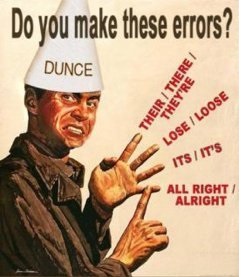As a language lover, you can find challenges in every language, and English is no different from others as it is a language of exceptions. No matter how hard you break your back to cramming the grammar rules, chances of mistakes always exist. Errors happen, sometimes due to lack of focus and often due to lack of focus.
Don’t get discouraged due to errors; rather take it as an opportunity to improve. However, there is only one way you can avoid such mistakes, and that is Practice! Put this into your habit, “Write once and read thrice,” so that you could prevent your writing pieces to be called as a pool of errors.
Well, this post contains 7 common English errors that are somewhat close to blunders. Take a glimpse of them, one by one:
Lose / Loose
“Lose” is a verb which means “to suffer the loss of something.” While “Loose” is an adjective which means “not tightly held or attached.”
For Example:
- I don’t want to lose this opportunity.
- This trouser fits very loose.
The Apostrophe Catastrophe
This error mostly happens while forming plural nouns.
For Example: Cat’s, Lot’s, ABC’s are all wrong.
In most of the cases, ‘S’ is added to make plurals, so the correct form is Cats, Lots, ABCs.
Also, apostrophe disaster can be noticed in possessive pronouns and contraction forms. Take a glance at them:
Its (a possessive pronoun) and It’s (a contraction of it is) both sound similar, create confusion, and lead to errors.
Gone / Went
“Gone” is a past participle while “Went” is the past tense of the word “go.” Understand the difference and always notice when you use these words. Let’s take an example:
Correct: I went to the supermarket. I should have gone to the local shop instead.
Incorrect: I should’ve went someplace.
Ideal / Idle / Idol
This trio creates too much confusion. Let’s sort it out.
“Ideal” is an adjective which means “exactly right or perfect for a particular purpose, situation or person.”
“Idle” is again an adjective which means “not working / not active.”
“Idol” is a noun which means “a greatly loved or admired person.”
For Example: Puerto Plata is an ideal location for the visitors who are fond of beaches.
There / Their / They’re
There is an adverb.
Is something wrong with this sentence? Yes, confusions are created in this way. So, punctuations matter the most. Now, see the sentence again.
“There” is an adverb which means “in that place” or “at that location.”
“Their” is a possessive pronoun which means “something may or is belongs to certain people, animals, or things.”
They’re, a contraction of “they are.”
For Example:
- I don’t want to go there.
- Their dog barks a lot.
- They’re going to break the rules.
To / Too / Two
“To” is a preposition which is used to indicate a place, person, thing, or activity.
“Too” is an adverb which means “to a high degree or extent” or “extremely.”
“Two” is a noun of number counting.
All three sound almost similar and create confusions.
For Example:
- Allow me to do this.
- She wants to join our group too.
- Two of them were too bad at writing stories.
Were / Where / We’re
“Were” is a past tense of verb “be.”
“Where” is and adverb which means “at or in what place.”
We’re, a contraction of we are.
For Example:
- They were best friends.
- Where is he going?
- We are the best group when it comes to singing.
Let us know more such common English mistakes in the comments box if you know any. Language Oasis has a penchant for language and we steer clear of errors. We have expert translators who enable us to offer the most sophisticated professional language translation services void of any such errors. Have any document to translate? Give us a call at 888-670-3369.
